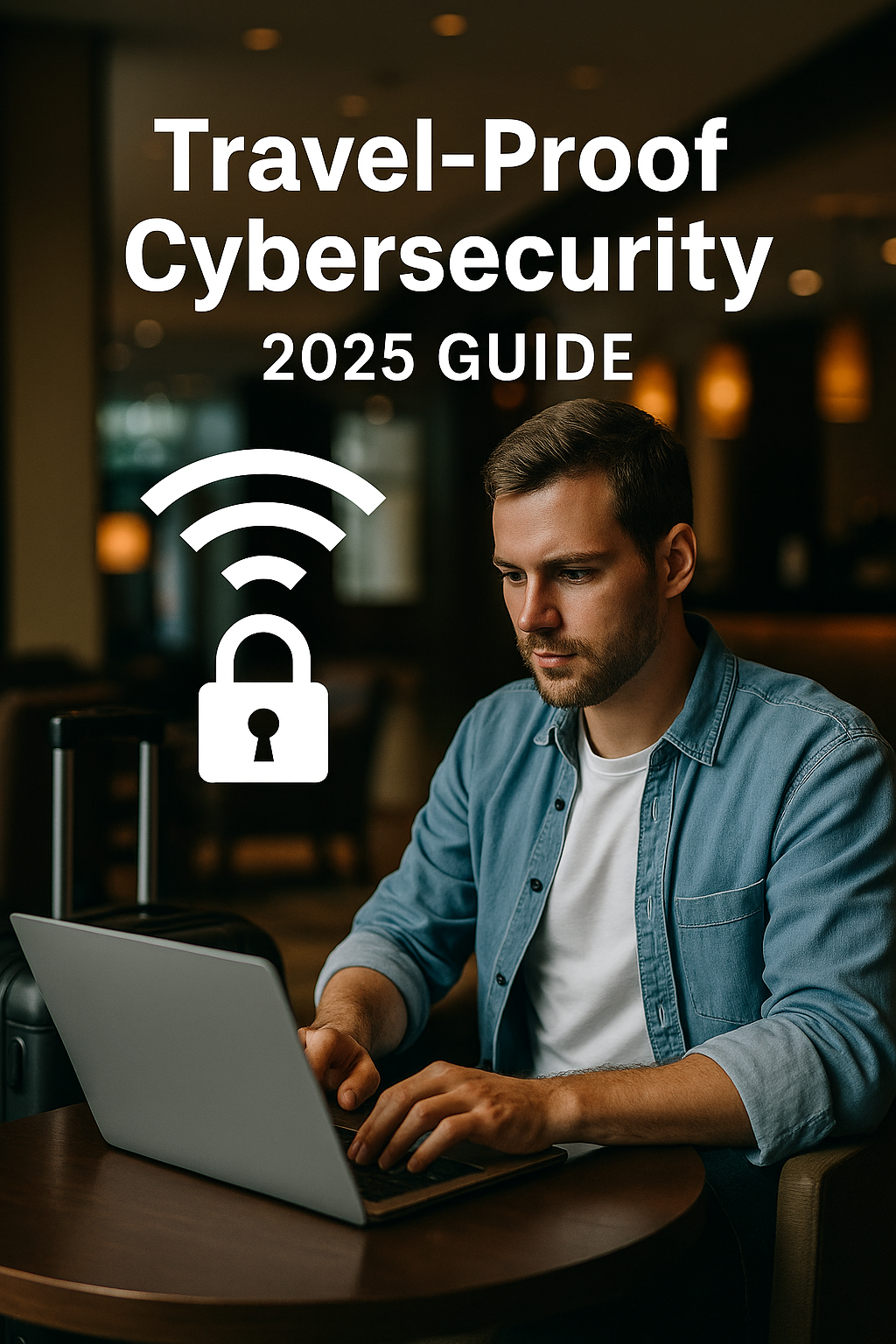Introduction
Every airport lounge, hostel common room and rideshare Wi-Fi hotspot is now a battlefield. The average traveler connects to 31 different networks on a two-week trip, and Kaspersky Labs logged a 43 % spike in credential-stuffing attacks on tourists in 2024. One breach can wipe multi-currency accounts, lock you out of freelance platforms and even invalidate a travel-insurance claim. This 2025 guide distills field-tested tactics—from penetration testers, digital-forensics teams and seven-figure nomad bloggers—to make your laptop and phone as resilient as your suitcase.
1 Threat Map for Mobile Professionals
| Vector | Typical Attack Window | Potential Loss | Recommended Shield |
|---|---|---|---|
| Rogue Wi-Fi AP (“Evil Twin”) | Airports, cafés | Credential theft, MITM swaps | VPN + MAC-address lock |
| SIM-swap social engineering | Local carrier kiosks | Bank MFA hijack | eSIM + carrier PIN |
| Shoulder-surfing & screen-glare | Planes, co-working desks | Password exposure | Privacy filter + 2FA |
| Juice-jacking USB hubs | Free charging stations | Firmware infection | 20 W data-block adapter |
| Border device search | Customs & immigration | Data copy, seizure | Secondary “travel phone,” cloud-wipe |
2 Zero-Trust Hardware Kit (Carry-On Weight ≈ 950 g)
- Travel laptop — Framework 13 or MacBook Air M3; wipe & re-image before every trip.
- Dedicated travel phone — Pixel 9a running GrapheneOS; 10-day eSIM plans pre-loaded.
- USB-C data blocker — PortaPow or SyncStop; severs data pins.
- YubiKey 5C NFC — Hardware FIDO2 + TOTP; stores no PII.
- Faraday sleeve — Silent Pocket pouch for spare passport and cards.
Total Amazon-cart cost ≈ US $2,150—yet one ransomware incident can cost five times more.
3 VPN, SASE & Beyond
- Consumer VPNs (Surfshark, NordVPN) encrypt traffic end-to-end but still depend on public DNS and may trigger streaming geo-blocks.
- SASE pocket gateway (Tailscale Funnel, Cloudflare Warp+ Teams) meshes every endpoint under a private WireGuard network and enforces DNS-over-HTTPS in hardware.
- On-device DoH (NextDNS) foils café-router spoofing and blocks trackers by default.
- Travel cube router (GL-iNet Beryl AX) shares a single VPN tunnel with all gadgets and quarantines hotel IoT devices.
4 Off-Network MFA & Password Stack
| Account | MFA Method | Offline Backup | Update Cycle |
|---|---|---|---|
| Banking/Brokerage | YubiKey FIDO2 + push | Extra key in hotel safe | 6 months |
| Freelance Platforms | Aegis TOTP | Printed OTP sheet | 90 days |
| Email & Social | Passkeys (device-synced) | Encrypted export in cloud | 30 days |
Never approve a push prompt unless your YubiKey is plugged in—phishing becomes irrelevant.
5 Special Defenses for Crypto & Fintech
- Non-custodial mobile wallets—load watch-only xpub on phone; keep signing keys on SteelSeed at home.
- Wise / Revolut / Monzo—lock card in-app when idle; require push approval for every transaction.
- Robo-advisor portals—enforce biometric + hardware key login; disable e-mail resets entirely.
- Brokerage IP allow-listing—route through Cloudflare Access and whitelist only your Tailscale exit node.
6 Live-Incident Playbook
A. Laptop stolen in Prague
- Trigger MDM remote-lock within 10 min.
- Rotate API tokens for every banking-as-a-service app.
- File police report (Form C-ZC/16) for travel-insurance reimbursement.
B. SIM-swap alert in Mexico City
- Ignore suspicious VoIP call; freeze bank logins immediately.
- Call carrier’s fraud desk; restore SIM with passport selfie.
- Push a fresh eSIM profile; re-enroll hardware MFA.
7 Monetizing Cybersecurity Content (Blogger Angle)
| Product | Typical Payout | How to Maximize |
|---|---|---|
| VPN annual plan | US $80–120 CPA | Offer region-specific coupons |
| Password manager | 30–50 % lifetime rev-share | Include comparison tables |
| Hardware keys & routers | 6–8 % Amazon bounty | Shoot hands-on demo video |
High-budget advertisers (cyber-insurance, endpoint suites) routinely bid US $18–30 eCPM on evergreen 2,000-word guides.
8 Forecast 2025-2027
- Gartner predicts 70 % of remote workers will adopt hardware keys by 2027.
- iOS/Android 17 will default to biometric-only passkeys synced via secure enclave.
- eVTOL ride-shares will provide in-flight SASE connectivity by 2026.
- Singapore is piloting a blockchain-anchored travel-ID wallet to replace paper passports.
Conclusion
Travel freedom ends where data insecurity begins. By adopting a zero-trust mindset—encrypting every packet, enforcing hardware-based identity, and carrying travel-dedicated gear—you reduce disaster to minor inconvenience. Treat cybersecurity as non-negotiable luggage weight and you’ll roam the planet with confidence, income streams intact and identity un-hijacked.
